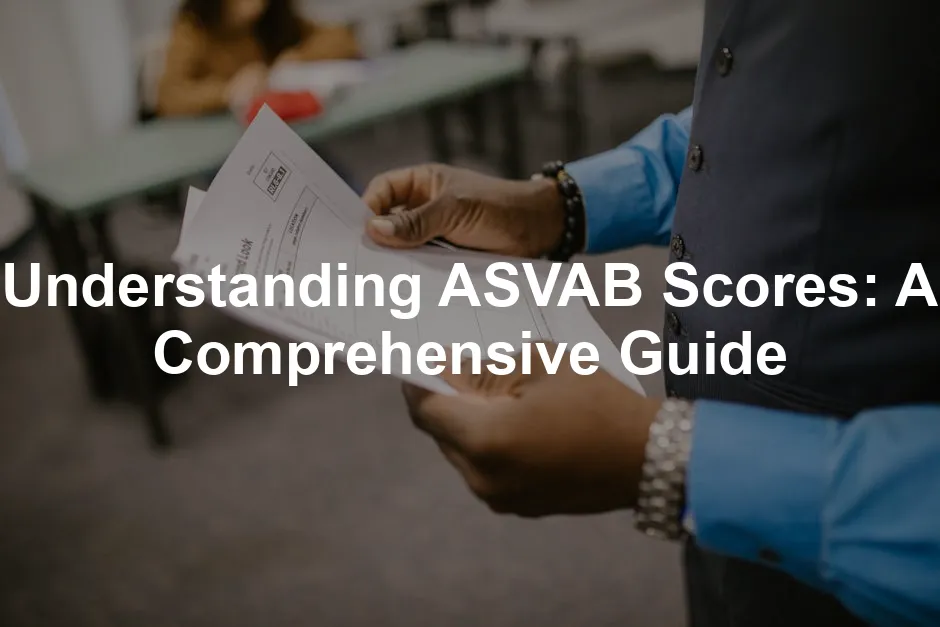Introduction
Have you heard of the Armed Services Vocational Aptitude Battery, or ASVAB? It’s a crucial test for anyone looking to enlist in the military. ASVAB scores play a significant role in determining your eligibility and career path in the armed forces. This article aims to clarify what ASVAB scores mean, their implications, and how you can improve them.
To ace the ASVAB, you might want to consider a comprehensive study guide. Check out the ASVAB Study Guide 2023-2024. This guide covers everything you need to know and will help you score higher!
Summary and Overview
The ASVAB is a standardized test used across all military branches to assess a recruit’s suitability. It helps match candidates with appropriate roles based on their skills and abilities. Understanding ASVAB scores is essential for potential recruits. Scores are structured in different ways, including Standard Scores, the Armed Forces Qualification Test (AFQT), and Composite Scores.
Standard Scores are calculated based on individual subtests. The AFQT score determines enlistment eligibility, while Composite Scores help identify suitable military jobs. Grasping these scores is vital for anyone considering a military career.
For those who want to dive deeper into the study material, ASVAB For Dummies offers a friendly approach to understanding the test material. It’s like having a study buddy who’s also a genius!

What is the ASVAB?
The ASVAB is designed to measure your knowledge and skills in various areas. Its purpose goes beyond testing; it helps find the right military career for you. The exam includes questions on subjects like math, science, and verbal skills.
Different sections assess your aptitude in specific areas, allowing for tailored career placements. For example, mechanical comprehension questions gauge your understanding of mechanical concepts. A strong performance can open doors to various military roles, making this test critical for your future.
To brush up on your mechanical skills, grab a copy of Barron’s ASVAB. It’s a solid resource that can help you ace those tricky questions!
Key Topics:
- Purpose of the ASVAB: To assess readiness for military service.
- Overview of test sections: Includes verbal, math, science, and technical skills.
- Relation to military recruitment: Scores determine eligibility and job placement.
Understanding ASVAB scores can significantly influence your military journey. Whether you’re aiming for a specific role or just exploring options, knowing what these scores mean will help you prepare effectively. Understanding ASVAB scores is crucial for your future.
Understanding ASVAB scores is essential for anyone considering a military career. Understanding ASVAB scores

How ASVAB Scoring Works
Understanding how ASVAB scoring works can be a game changer for your military career. The ASVAB uses a scoring model called Item Response Theory (IRT). This method evaluates your responses to questions based on three main factors: difficulty, discrimination, and guessing. Each question is designed to assess your ability level, ensuring a fair evaluation.
Now, let’s break down the scores you receive. You’ll see two terms: raw scores and standard scores. Raw scores represent the number of questions you answered correctly. However, these scores don’t provide a complete picture. Standard scores, on the other hand, are adjusted based on the performance of a national sample of test-takers. This standardization allows for better comparisons across different test versions and populations.
If you’re serious about improving your scores, consider the Kaplan ASVAB Prep Plus. This guide provides you with strategies and practice tests that can help you tackle the ASVAB with confidence!
Key Topics:
- Item Response Theory (IRT): A sophisticated scoring method that customizes evaluations based on individual performance.
- Raw scores vs. Standard scores: Raw scores show correct answers, while standard scores contextualize performance against a broader group.
- Calculation methods for scores: Scores are derived from your responses and adjusted using IRT principles.

Breakdown of ASVAB Scores
ASVAB scores consist of several components, with Standard Scores being particularly important. These scores are calculated based on how you performed in each subtest. The average score is set at 50, with a standard deviation of 10. This means that a score of 60 is considered above average, while a score of 40 is below average.
A crucial part of the ASVAB is the Armed Forces Qualification Test (AFQT). It combines scores from four key subtests: Arithmetic Reasoning, Mathematics Knowledge, Paragraph Comprehension, and Word Knowledge. Your AFQT score is expressed as a percentile, indicating how you performed compared to others. For instance, an AFQT score of 90 means you scored better than 90% of the reference group.
To help you prepare for these key concepts, I recommend using ASVAB Secrets Study Guide. It provides a thorough breakdown of what you need to know for the test!
Key Topics:
- Definition of Standard Scores: Scores that reflect performance relative to others in a national sample.
- Calculation of AFQT scores: Derived from specific subtests that measure essential skills for military service.
- Importance of AFQT for enlistment: Determines eligibility for joining the armed forces, making it a key focus for applicants.

ASVAB Subtests and Their Impact
The ASVAB features nine subtests, each measuring different skills. For instance, Arithmetic Reasoning assesses your ability to solve word problems, while Word Knowledge evaluates your vocabulary. Each subtest contributes to your overall score and can influence your career opportunities in the military.
Each subtest carries a different weight depending on the military role you aim for. For example, strong scores in Mechanical Comprehension might be crucial for technical roles. Understanding which subtests are most relevant to your desired job can help you prepare effectively and improve your chances of success.
To keep your study materials organized, consider using a Study Planner Notebook. It’s an excellent tool to help you track your study sessions and keep your goals in check!
Key Topics:
- Overview of subtests: Nine subtests cover varied knowledge areas, from science to verbal skills.
- Weight of each subtest in scoring: Different subtests impact scores based on the specific military roles.
- Importance of different subtests for various military roles: Tailored preparation can enhance your qualifications for your desired career path.

Understanding AFQT Categories
When you’re preparing for the ASVAB, understanding the Armed Forces Qualification Test (AFQT) categories is crucial. The AFQT scores determine your eligibility for enlistment in the military. They are based on your performance in four specific subtests: Arithmetic Reasoning, Mathematics Knowledge, Paragraph Comprehension, and Word Knowledge.
These scores are classified into categories, which can significantly impact your recruitment options. Higher AFQT scores indicate better potential for various military roles. Here’s a quick breakdown of the AFQT categories and their importance:
| AFQT Category | Score Range |
|---|---|
| I | 93 – 99 |
| II | 65 – 92 |
| IIIA | 50 – 64 |
| IIIB | 31 – 49 |
| IVA | 21 – 30 |
| IVB | 16 – 20 |
| IVC | 10 – 15 |
| V | 1 – 9 |
Scores in the higher categories open doors to a broader range of enlistment options. For example, a Category I score (93-99) may qualify you for specialized positions, while lower scores may limit your choices. Understanding these categories helps you set realistic goals and prepares you for what lies ahead in your military journey.
Key Topics:
- AFQT categories explained: These categories reflect your performance relative to other test-takers.
- Score ranges and their implications: Higher categories indicate better opportunities.
- How scores affect enlistment options: Your score can determine job possibilities within the military.

Composite Scores and Military Job Placement
Composite Scores, often referred to as line scores, are essential for determining your job placement in the military. These scores are calculated using specific combinations of ASVAB subtest scores. Each military branch has its own set of criteria for these calculations.
To calculate your Composite Scores, the military uses various subtests relevant to specific roles. For example, if you’re interested in a technical job, your scores in Electronics Information and Mathematics Knowledge will weigh heavily.
Here are a few examples of how Composite Scores work for different military jobs:
- Clerical: Combines Word Knowledge, Paragraph Comprehension, and Arithmetic Reasoning.
- Electronics: Uses General Science, Arithmetic Reasoning, and Mathematics Knowledge.
- Combat: Involves Arithmetic Reasoning, Mechanical Comprehension, and Auto & Shop Information.
Understanding your Composite Scores is vital for ensuring you qualify for the roles you desire. A well-rounded score can grant you access to various positions, enhancing your military career prospects. For those looking to calculate their scores efficiently, a Military Grade Calculator could come in handy!
Key Topics:
- Definition and calculation of Composite Scores: These scores reflect your aptitude in specific skill areas.
- Examples of Composite Scores for different military jobs: Different roles require different score combinations.
- Importance of Composite Scores for career placement: They guide recruiters in matching you with suitable positions.

Preparing for the ASVAB
Getting ready for the ASVAB can feel overwhelming, but with the right approach, you can boost your chances of success. Start by familiarizing yourself with the test format and types of questions. This will help you feel more confident when test day arrives.
Effective study methods can make a big difference. Consider these tips:
- Create a Study Schedule: Plan dedicated time for each subject area.
- Use Online Resources: Websites and apps offer practice questions and tutorials.
- Join Study Groups: Collaborating with others can enhance your learning experience.
Additionally, practice exams are crucial. They help you understand the timing and pressure of the actual test. By simulating the exam environment, you’ll be better prepared on test day. To make studying more enjoyable, grab a set of ASVAB Flashcards. They’re a fun way to test your memory and knowledge!
Key Topics:
- Effective study methods: A structured approach is essential for success.
- Recommended resources for preparation: Utilize online tools and books.
- Importance of practice exams: These prepare you for the real test conditions.

Common Questions About ASVAB Scores
When it comes to ASVAB scores, many questions arise. Let’s tackle some of the most common concerns recruits have.
Can you retake the ASVAB?
Yes, you can retake the ASVAB. If you’re not satisfied with your scores, there are specific rules to follow. After your first attempt, you must wait 30 days before retaking the test. If you’re still not happy, a second attempt requires another 30-day wait. After your third try, a six-month waiting period is necessary before you can take the test again. Keep in mind, your latest scores will be the ones used for enlistment.
Validity of ASVAB scores
ASVAB scores are valid for two years from the date of the test. This means you can use your scores for enlistment within that time frame. If you wait longer than two years, you will need to retake the ASVAB to be eligible for military service.
Impact of retaking on enlistment
Retaking the ASVAB can impact your enlistment options. If you improve your scores, you may qualify for more military jobs or even special programs. However, if your scores decrease, you may limit your opportunities. Always aim for the best score possible to maximize your enlistment options.

Conclusion
In summary, understanding ASVAB scores is crucial for anyone considering a military career. Knowing how long your scores are valid and the process for retaking the test can significantly influence your options. To increase your chances of success, prepare thoroughly for the exam. Equip yourself with the right resources and knowledge to achieve the score you need for your desired military path. Good luck!
FAQs
What is a good ASVAB score?
A good ASVAB score typically falls above 50. The average score is set at 50, with a standard deviation of 10. This means that scores of 60 or higher are above average. These scores can significantly influence your eligibility for military enlistment and job placements. Each branch of the military has its own minimum score requirements, so it’s vital to check those as you prepare.
How long are ASVAB scores valid?
ASVAB scores remain valid for two years from the date you take the test. This means you can use your scores for enlistment during this period. If you don’t enlist within two years, you will need to retake the test to qualify for military service again.
Can I retake the ASVAB if I am not satisfied with my scores?
Yes, you can retake the ASVAB if you’re not happy with your scores. However, there are waiting periods. After your first attempt, you must wait 30 days before retaking the test. If you still wish to improve your scores after a second attempt, a six-month wait is required before your next try. This policy ensures you have time to prepare more effectively.
What if I have a GED instead of a high school diploma?
If you hold a GED rather than a high school diploma, the score requirements can differ. Generally, GED holders need higher AFQT scores than traditional high school graduates. For example, many branches require a minimum AFQT score of 50 for GED holders, while the minimum for high school graduates can be lower. Always check specific branch requirements to confirm.
How can I improve my ASVAB scores?
Improving your ASVAB scores is possible with focused preparation. Here are some effective strategies: 1. Study Regularly: Set aside time each week dedicated to studying. 2. Use Practice Tests: Take advantage of online resources and practice exams. 3. Identify Weak Areas: Focus on subjects where you struggle the most. 4. Join a Study Group: Collaborate with others to enhance your learning experience. 5. Visit Official Resources: Utilize materials from the official ASVAB website for reliable information and tips. By incorporating these strategies, you can increase your chances of achieving a desirable score.
Please let us know what you think about our content by leaving a comment down below!
Thank you for reading till here 🙂
All images from Pexels




